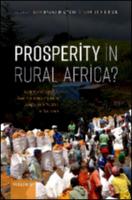Prosperity in Rural Africa?
Insights into Wealth, Assets, and Poverty from Longitudinal Studies in Tanzania
Contributor(s)
Brockington, Dan (editor)
Christine Noe (editor)
Language
EnglishAbstract
What does it mean to say that rural areas of Africa are poor? Many people insist that in rural African populations poverty is prevalent. This is either because the smallholder agricultural practices are unproductive or it is because economic policies have not protected and promoted African farming. But whether this deprivation is the fault of the peasant, or the government, both sides agree on the facts of rural poverty. However in both cases rural poverty is described using measures which make it hard, if not impossible, to capture new forms of wealth that rural people may be accruing. These new forms of wealth, which largely comprise productive assets, are especially important because they feature so prominently in rural peoples’ own definitions of wealth. Using an unprecedented collection of longitudinal surveys, in which experienced researchers have revisited villages that they have known for decades, the volume tracks surprising increases in assets in diverse locations in Tanzania. The result of these findings is a compilation which is fascinating in itself and important for the understanding of rural economies’ development data and agricultural policy.
Keywords
assets, poverty, prosperity, rural areas, Tanzania, agriculture, longitudinal researchDOI
10.1093/oso/9780198865872.001.0001ISBN
9780198865872, 9780198865872Publisher
Oxford University PressPublisher website
https://global.oup.com/Publication date and place
Oxford, 2021Grantor
Classification
Development economics and emerging economies
Economic growth
Agricultural and rural economics


 Download
Download Web Shop
Web Shop